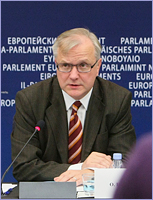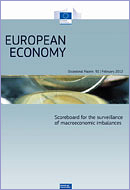 |
 |
|
|
|
|
 |
 |
 |
 |
European Commission Alert Mechanism Report identifies 12 EU countries for further review of their potential macroeconomic imbalances
On 14 February, the European Commission adopted its first ever, annual Alert Mechanism Report (AMR). The report screens EU Member States based on a scoreboard of ten macroeconomic indicators. It is the starting point for the Macroeconomic Imbalance Procedure (MIP), a new surveillance tool that helps to detect and correct risky macroeconomic developments in the EU and the euro area. The MIP forms part of the new EU economic governance rules (often referred to as the “six-pack”) that entered into force on 13 December 2011. Based on the current AMR, the Commission has identified twelve Member States that may be affected by harmful macroeconomic imbalances, such as such as a loss of competitiveness, high levels of indebtedness or asset price bubbles. Further country-specific reviews will be conducted to provide a clearer picture. If the Commission then finds that harmful imbalances exist, it may issue a recommendation to the Member State concerned, requesting it to take appropriate action to correct the situation.
|
 |
 |

This crisis has highlighted the tremendous risks that macroeconomic imbalances pose for financial stability, economic prospects and welfare of a country and its citizens. This new tool we are using today is a meaningful step towards correcting the imbalances which built up over the years. Sound fiscal policies and early detection and correction of risky economic imbalances are necessary conditions to return to sustainable growth and jobs.
Olli Rehn, European Commission Vice-President and Commissioner for Economic and Monetary Affairs and the Euro |
 |
 |
|
|
|
|
 |
|
 |
 |
 |
 |
 |
 |
Macroeconomic Imbalance Procedure becomes operational
With the publication of the first annual Alert Mechanism Report (AMR) by the Commission on 14 February, the Macroeconomic Imbalance Procedure (MIP) has become operational for the first time. The MIP is a surveillance mechanism that aims to prevent and correct macroeconomic imbalances within the EU at an early stage. It relies on an alert system that uses a scoreboard of ten indicators and may trigger in-depth country studies. They may lead to recommendations for preventive actions to avoid further build-up of harmful imbalances. In more serious cases, the Commission will recommend corrective actions, combined with strict rules in the form of a new Excessive Imbalance Procedure (EIP) and enforcement in the form of financial sanctions for euro area Member States that do not follow up on recommendations. The MIP is based on Article 121.6 of the Treaty.
|
 |
|
 |
 |
 |
|
 |
 |
 |
 |
 |
 |
G8 Finance Deputies advance on Deauville Partnership economic track
The G8 Finance Deputies met on 9 February in Abu Dhabi to prepare economic and financial initiatives of the Deauville Partnership (DP). The initiatives are to be agreed at the Chicago Summit on 19-20 May. The Partnership seeks to develop a more coordinated and holistic approach by the G8 countries in support of the political and economic transitions in Egypt, Jordan, Morocco and Tunisia. Among other issues, participants considered recent macroeconomic developments in the DP countries plus Libya, the extension of the European Bank for Reconstruction and Development’s (EBRD) geographical scope to Southern Mediterranean countries and the latest recommendations in the area of trade and investment. New proposals for more concrete initiatives were introduced and are currently being considered.
|
 |
|
 |
 |
 |
|
 |
 |
 |
 |
 |
 |
Barroso and Van Rompuy meet with Chinese public at EU-China summit
During this week's EU-China summit, the EU’s two top leaders: Council President Van Rompuy and Commission President Barroso explained to the Chinese public how Europe is “putting its house in order”. Europe is taking all the necessary steps to restore confidence, financial stability and growth in the euro area, the leaders said. Appearing before more than 700 enthusiastic students, numerous members of the press and VIPs, the EU leaders together with the Governor of the People's Bank of China, Zhou Xiaochuan, also stressed the important role of the euro in the international monetary system, and emphasised how the euro is so much more than just a currency – it is a symbol of integration across 17 countries. The 7th EU-China Business Summit 2012 was held alongside the EU-China Summit. This year the summit focused on possibilities that China offers to SMEs, as well as the major opportunities brought by urbanisation, industrial upgrading, innovation and growth in services.
|
 |
|
 |
 |
 |
|
 |
 |
 |
 |
 |
 |
Euro exhibition opens in China
In parallel with the EU-China summit, Council President Van Rompuy and Commission President Barroso opened the information campaign on the euro in Beijing, an exhibition running at the University of International Business and Economics for 10 days before continuing its tour around major Chinese cities. The campaign aims to raise awareness among students and selected stakeholders in China about the euro, the sovereign-debt crisis and the EU response to address it. China is an increasingly important partner to the EU and the EU is China's largest export market. According to the most recent data from Eurostat, the EU statistical office, as of 13 February, EU exports to China are up by 21% and imports by 5% in the first ten months of 2011. Evidently, there is strong interest in and support for the euro area among the Chinese leadership. However, awareness and understanding of the euro area is less strong in the media.
|
 |
|
 |
 |
 |
|
 |
 |
 |
 |
 |
 |
Registration open for ECFIN Country workshop on EU Balance-of-Payments assistance for Latvia
Registration is now open for the ECFIN country workshop “EU Balance-of-Payments assistance for Latvia: Foundations of Success”. The workshop, which will take place on 1 March, is being is organized by ECFIN and the Bank of Latvia. During two policy panels and a roundtable discussion, participants will provide insights into the political and policy aspects of Latvia’s adjustment, discuss lessons learned – also from a broader European perspective – and consider the way forward for Latvia. The workshop brings together the highest-level representatives of Latvia, the international institutions and bilateral lenders involved in the Latvian rescue, and experts from both academia and the private sector.
|
 |
|
 |
 |
 |
|
 |
 |
 |
 |
 |
 |
Rehn welcomes positive vote of Greek Parliament on the second programme for Greece
Speaking on behalf of the European Commission on 13 February, Olli Rehn, Vice-President of the European Commission and Commissioner for Economic and Monetary Affairs and the Euro, welcomed the positive vote of the Greek Parliament on the second programme for Greece. Rehn called the vote “an expression of the determination prevailing in the country to put an end to the spiral of unsustainable public finances and to the loss of competitiveness.” He reaffirmed the EU’s commitment to assisting Greece’s return to sustainable growth and employment but noted that it would inevitably be “a long-term endeavour”. While acknowledging that the second programme to be implemented now is going to be very demanding, Rehn said that it would “pave the way to redress the difficult situation”.
|
 |
|
 |
 |
 |
|
 |
 |
|
 |
 |
 |
 |
 |
 |
Commission proposes European Foundation Statute to make it easier for foundations to support public benefit causes across the EU
The European Commission has proposed a European Foundation Statute that would make it easier for foundations to support public benefit causes across the EU. The proposal, issued on 8 February, calls for the creation of a single European legal form - the ‘European Foundation’ (FE) – which would be fundamentally the same in all Member States and exist in parallel with domestic foundations. Foundations often have to spend a part of their resources on legal advice and fulfilling legal and administrative requirements laid down by the different national laws across the EU. This diminishes the amount of funding available to foundations for the purpose of activities benefiting the public at large and can deter them from further developing their work.
|
 |
|
 |
 |
 |
|
 |
 |
|
 |
 |
 |
 |
 
|
 |
Scoreboard for the surveillance of macroeconomic imbalances
This paper elaborates on the design of the initial scoreboard as presented in the first Alert Mechanism Report (AMR) issued by the Commission on 14 February 2012. The paper describes in more detail the rationale behind the different indicators, the choices made in the selection process and how they should be economically understood in the context of the Macroeconomic Imbalance Procedure (MIP). The scoreboard consists of a set of ten indicators with indicative thresholds: two indicators aim at monitoring external positions, three indicators capture competitiveness developments and the subsequent five indicators reflect internal imbalances.
|
| |
 |
|
 |
 |
|
 |
 |
 |
|
 |
 |
 |
|
 |
 |
 |
|
 |
 |
Directorate-General for Economic and Financial Affairs |
|
|
|
 |
|